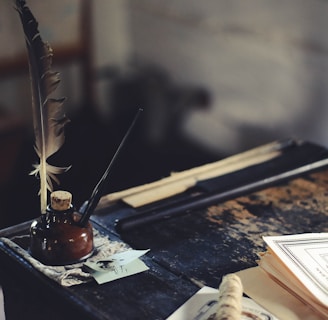The Power of Poetic Techniques in Prose Writing
Bibliotheca Exotica
4 min read


Prose writing is often associated with straightforward and direct language, while poetry is known for its creative use of rhythm, rhyme, and imagery. However, the boundaries between these two forms of writing are not as rigid as they may seem. In fact, the use of poetic techniques in prose can elevate the quality of the writing, adding depth, emotion, and a lyrical quality to the narrative. In this article, we will explore the power of poetic techniques in prose writing and provide detailed tips on incorporating these techniques to enhance your own writing.
The Role of Poetic Techniques in Prose Writing
Before we delve into the specific poetic techniques that can be used in prose writing, let's first understand why these techniques are valuable and how they can enhance the overall quality of the writing.
1. Rhythm: Just as in poetry, rhythm plays a crucial role in prose writing. By incorporating a rhythmic flow in your prose, you can create a sense of musicality that engages the reader. This rhythmic quality can make the writing more captivating and enjoyable to read.
2. Emotion: Poetic techniques such as imagery and metaphor can evoke powerful emotions in the reader. By using vivid and descriptive language, you can paint a picture in the reader's mind and elicit a strong emotional response. This emotional resonance can make your prose more memorable and impactful.
3. Lyrical Quality: The use of poetic techniques can infuse your prose with a lyrical quality, making it more poetic and artistic. This can elevate the writing from being purely informative to being a work of art that resonates with the reader on a deeper level.
Specific Poetic Techniques for Prose Writing
Now that we understand the importance of poetic techniques in prose writing, let's explore some specific techniques that you can incorporate into your own writing:
1. Meter
Meter refers to the rhythmic pattern of a line of poetry. While it is more commonly associated with poetry, incorporating meter into prose can add a musical quality to the writing. One way to achieve this is by paying attention to the syllable count and the arrangement of stressed and unstressed syllables in your sentences. Experiment with different rhythms and patterns to create a unique and engaging prose style.
For example:
"The waves crashed against the shore, their relentless rhythm echoing in my soul."
2. Rhyme
Rhyme is another poetic technique that can be effectively used in prose writing. While full rhymes may feel forced in prose, incorporating partial rhymes or slant rhymes can add a subtle musicality to the writing. Look for words that have similar sounds or end with the same consonant or vowel, and use them strategically to create a pleasing and harmonious effect.
For example:
"The moonlight danced on the water, casting a shimmering glow."
3. Imagery
Imagery is one of the most powerful poetic techniques that can be used in prose writing. By using vivid and sensory language, you can create a rich and immersive experience for the reader. Paint a picture with your words, appealing to the reader's senses of sight, sound, taste, touch, and smell. This will make your prose come alive and leave a lasting impression on the reader.
For example:
"The scent of freshly baked bread wafted through the air, enticing me with its warm and comforting embrace."
4. Metaphor
A metaphor is a figure of speech that compares two unrelated things, often by stating that one thing is another. By using metaphors in your prose, you can add depth and layers of meaning to your writing. Metaphors can be used to convey complex emotions or abstract concepts in a more tangible and relatable way, making your prose more engaging and thought-provoking.
For example:
"Her laughter was a symphony, filling the room with joy and melody."
Tips for Incorporating Poetic Techniques into Prose Writing
Now that we have explored some specific poetic techniques, here are some tips to help you incorporate these techniques into your own prose writing:
1. Read and study poetry: To effectively use poetic techniques in your prose, it is important to have a good understanding of how these techniques are used in poetry. Read a variety of poems from different poets and styles, and pay attention to how they use rhythm, rhyme, imagery, and metaphor. This will help you develop a better sense of how to incorporate these techniques into your own writing.
2. Practice: Like any skill, incorporating poetic techniques into your prose writing requires practice. Set aside dedicated time to experiment with different techniques and styles. Write prose passages using different rhythms, explore different rhyming patterns, and create vivid imagery and metaphors. The more you practice, the more natural and seamless these techniques will become in your writing.
3. Edit and revise: After incorporating poetic techniques into your prose, it is important to edit and revise your work. Pay attention to the flow and rhythm of your sentences, ensuring that they are smooth and musical. Look for opportunities to add or refine imagery and metaphors, making them more vivid and impactful. By carefully editing and revising your work, you can polish your prose and make it shine.
4. Read your work aloud: To truly gauge the effectiveness of your poetic techniques, read your work aloud. This will help you identify any awkward or clunky sentences, as well as areas where the rhythm and flow can be improved. Reading aloud also allows you to fully experience the emotional impact of your writing, helping you fine-tune it for maximum effect.
Conclusion
Incorporating poetic techniques into prose writing can add a new dimension to your work, enhancing its rhythm, emotion, and lyrical quality. By paying attention to elements such as meter, rhyme, imagery, and metaphor, you can create prose that is engaging, memorable, and impactful. So, don't be afraid to experiment with these techniques and let your creativity soar. Happy writing!

